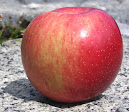And rejoinder videos.
Steven Edholm, the polymathic paeleolith from Turkeysong ("a homestead in the beautiful coastal mountains of Northern California" as well as a blog) took the time to respond to yesterday's video about apple breeding from one of the big commercial breeders in New Zealand.
I've edited his remarks lightly; emphasis is added.
I noticed a while back how much breeding is the beginning of a line of thinking toward more and more sophisticated marketing. It seems like the trend is a little more skewed toward consumer satisfaction now.
I'm not convinced that they always know what consumers will want, given a broad choice [ya think?—Adam.], but apple quality in stores has certainly improved tremendously since I was a kid.
As many apples as it seems like they are releasing the entire industrial apple system will never be about diversity, or about really serving human needs or culture in a broader sense. It is, as the man said, a business.
In that business consumers have a role, which is to be trained to buy certain things. When a new thing comes along, they will be herded toward that. In some ways this system serves us and in others it makes us weak and disconnected from our food. It certainly reduces food and cultivar diversity, always.

|
|
A
King David apple
from Turkeysong Farm, ca 2012 |
I don't think we should accept that this is the only place our food comes from, or we will lose a lot that is very valuable. These people will never use some of the amazing parents I'm using in breeding, because they just have unsuitable traits.
We need to keep eating, growing and yes, even breeding, a diverse array of apples in our own localized, living food cultures if we are to keep any kind of resiliency outside that system that has been set up for us to feed at, and preserve diversity, even if it's just for diversity's sake.
I don't advocate narrow conservatism at all. I think many old apple varieties are not worth keeping actually, but there are a lot that are, and diversity has it's own benefits independent of that. I think we can embrace local traditions and create new ones, while still using the industrial food system in the ways that it really does serve us.
I talk about some of this in my amateur apple breeding video series on youtube, for which here is a link. The whole first two videos are mostly talking about the industrial system v.s. small and non-commercial breeding. https://www.youtube.com/watch?v=SB5-4Nxej2I&list=PL60FnyEY-eJAMOPvU-yyF4JfuW5ocJvC4
In his first video, Steven takes aim at the idea that only large-scale apple-breeding programs can be fruitful:
and also at modern breeders for valuing looks over taste. As he says at about 11:00,
Once anyone's bitten into an apple that is just totally really amazing...is not going to care what that apple looks like so much any more.
Steven writes quite a bit about apples (and other things) on his blog about the homestead. Here's a link to a blog post he wrote introducing his apple-breeding video series, which is planned to follow his entire breeding project.

Glad to see Steven's work getting some more visibility - great stuff.
ReplyDeleteThanks Adam! The industrial food system is a double edged sword. It's utility cannot, and should not, be denied, but if we aren't conscious of it's faults, and we accept it as our sole source of nourishment, we are asking to get reamed in so many ways. I believe alternatives very much involve breeding, not only for apples, but for all food plants.These people are turning out some really good work, and I think it will get better. But, I think their motivation remains essentially the same and they just learned some valuable lessons about how to go wrong with the red delicious scenario. It seems unlikely that amateur breeders could achieve some of the results they are going to get with disease resistance without some kind of cooperative effort, but we can still make use of those genes eventually. I really appreciate the leg up. I think about this stuff a lot and it's nice to be heard!
ReplyDeleteNope, I get to thank you, Steven. I've been meaning to point to your stuff for a while, you just made it super easy.
DeleteRed Delicious is a cautionary tale. I think that farmers and breeders took a little of that lesson in, at least I hope so.